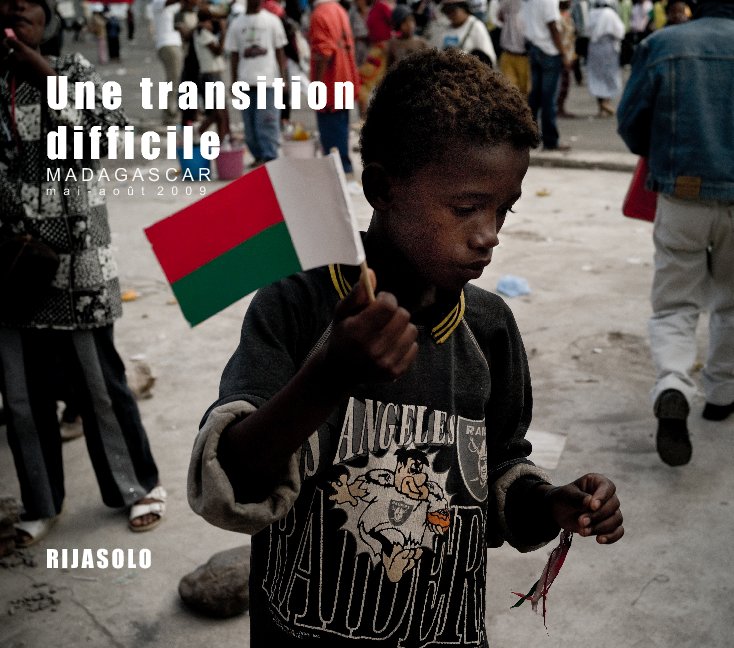Une transition difficile
Madagascar mai- août 2009
by Rijasolo
This is the price your customers see. Edit price list
About the Book
Following an acute 3-month crisis that officially left over 100 dead, the Malagasy President, Marc Ravalomanana, was unexpectedly overthrown. The insurgent was Andry Nirina Rajoelina, 34-year-old mayor of Antananarivo and a former DJ who made his fortune in advertising (earning him the nickname Andry TGV, as in “high-speed train”).
On 17 March 2009, with the help of mutinous soldiers, he became President of the High Authority of Transition (HAT).
The young Rajoelina is promising to get the country firmly and swiftly back on its feet. He has urgent work to do, given the catastrophic situation: Madagascar is placed 143 (out of 177) on the Human Development Index, and has a longstanding record as one of the poorest countries in the world. 70% of its 20 million inhabitants live on less than a dollar a day. The task is complicated further by the “legalist” supporters of Ravalomanana, who is living in exile on the African continent, and an international community opposed to the coup d’état. And ever since large organizations like the African Union, the International Organization of Francophonie and the SADC pulled the rug from under its feet, Madagascar has never been so alone. The main overseas investors and funders that helped Madagascar stay above water have also rapidly left the country.
Since March 2009, the HAT has increasingly shown itself willing to run the country. There has been criticism, however, of its governing style, including the severe repression of Ravalomanana supporters and its failure to reach a consensus with its opponents regarding Madagascar’s democratic future. Matters have been complicated further by the recent breakdown of negotiations in Maputo, where it was revealed that the crisis in early 2009 stemmed from a purely personal clash of interests between Rajoelina and Ravalomanana.
Yet while the political leaders argue about who should legitimately hold power, the island’s inhabitants have seen no improvement in their daily battles to find a job, get enough to eat, and think about their future, if possible a brighter one.
The global economic crisis has not yet reached Madagascar, but food riots are predicted in the coming months.
Once more, the Malagasy people will have to make do and survive by themselves.
On 17 March 2009, with the help of mutinous soldiers, he became President of the High Authority of Transition (HAT).
The young Rajoelina is promising to get the country firmly and swiftly back on its feet. He has urgent work to do, given the catastrophic situation: Madagascar is placed 143 (out of 177) on the Human Development Index, and has a longstanding record as one of the poorest countries in the world. 70% of its 20 million inhabitants live on less than a dollar a day. The task is complicated further by the “legalist” supporters of Ravalomanana, who is living in exile on the African continent, and an international community opposed to the coup d’état. And ever since large organizations like the African Union, the International Organization of Francophonie and the SADC pulled the rug from under its feet, Madagascar has never been so alone. The main overseas investors and funders that helped Madagascar stay above water have also rapidly left the country.
Since March 2009, the HAT has increasingly shown itself willing to run the country. There has been criticism, however, of its governing style, including the severe repression of Ravalomanana supporters and its failure to reach a consensus with its opponents regarding Madagascar’s democratic future. Matters have been complicated further by the recent breakdown of negotiations in Maputo, where it was revealed that the crisis in early 2009 stemmed from a purely personal clash of interests between Rajoelina and Ravalomanana.
Yet while the political leaders argue about who should legitimately hold power, the island’s inhabitants have seen no improvement in their daily battles to find a job, get enough to eat, and think about their future, if possible a brighter one.
The global economic crisis has not yet reached Madagascar, but food riots are predicted in the coming months.
Once more, the Malagasy people will have to make do and survive by themselves.
Features & Details
- Primary Category: Arts & Photography Books
-
Project Option: Standard Landscape, 10×8 in, 25×20 cm
# of Pages: 48 - Publish Date: Aug 22, 2010
- Keywords madagascar, photography, photographe, Rijasolo
See More


